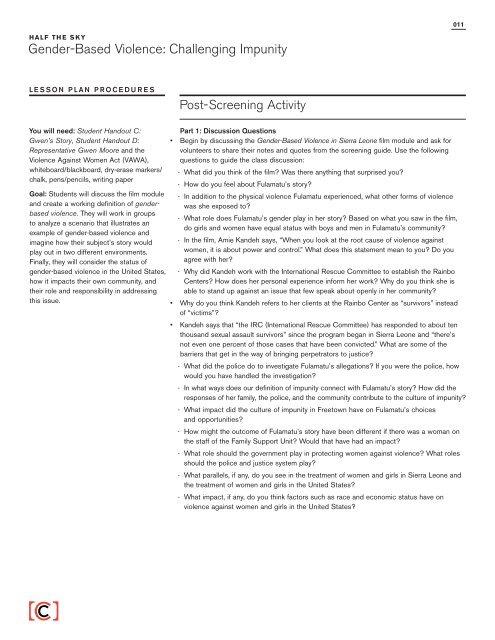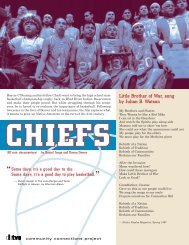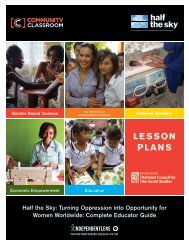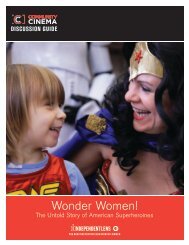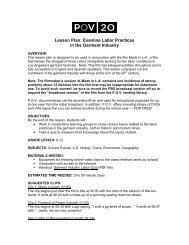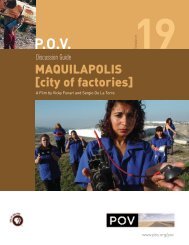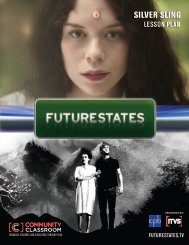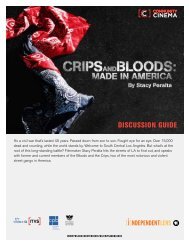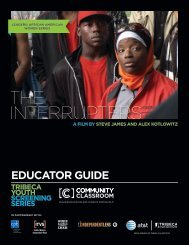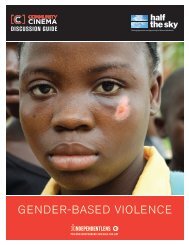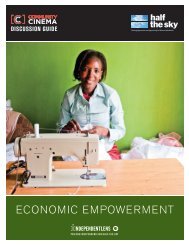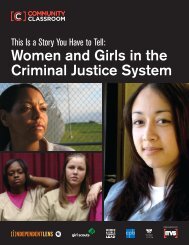Gender-Based Violence: Challenging Impunity - ITVS
Gender-Based Violence: Challenging Impunity - ITVS
Gender-Based Violence: Challenging Impunity - ITVS
Create successful ePaper yourself
Turn your PDF publications into a flip-book with our unique Google optimized e-Paper software.
011<br />
HALF THE SKY<br />
<strong>Gender</strong>-<strong>Based</strong> <strong>Violence</strong>: <strong>Challenging</strong> <strong>Impunity</strong><br />
LESSON PLAN PROCEDURES<br />
Post-Screening Activity<br />
You will need: Student Handout C:<br />
Gwen’s Story, Student Handout D:<br />
Representative Gwen Moore and the<br />
<strong>Violence</strong> Against Women Act (VAWA),<br />
whiteboard/blackboard, dry-erase markers/<br />
chalk, pens/pencils, writing paper<br />
Goal: Students will discuss the film module<br />
and create a working definition of genderbased<br />
violence. They will work in groups<br />
to analyze a scenario that illustrates an<br />
example of gender-based violence and<br />
imagine how their subject’s story would<br />
play out in two different environments.<br />
Finally, they will consider the status of<br />
gender-based violence in the United States,<br />
how it impacts their own community, and<br />
their role and responsibility in addressing<br />
this issue.<br />
Part 1: Discussion Questions<br />
• Begin by discussing the <strong>Gender</strong>-<strong>Based</strong> <strong>Violence</strong> in Sierra Leone film module and ask for<br />
volunteers to share their notes and quotes from the screening guide. Use the following<br />
questions to guide the class discussion:<br />
--<br />
What did you think of the film Was there anything that surprised you<br />
--<br />
How do you feel about Fulamatu’s story<br />
--<br />
In addition to the physical violence Fulamatu experienced, what other forms of violence<br />
was she exposed to<br />
--<br />
What role does Fulamatu’s gender play in her story <strong>Based</strong> on what you saw in the film,<br />
do girls and women have equal status with boys and men in Fulamatu’s community<br />
--<br />
In the film, Amie Kandeh says, “When you look at the root cause of violence against<br />
women, it is about power and control.” What does this statement mean to you Do you<br />
agree with her<br />
--<br />
Why did Kandeh work with the International Rescue Committee to establish the Rainbo<br />
Centers How does her personal experience inform her work Why do you think she is<br />
able to stand up against an issue that few speak about openly in her community<br />
• Why do you think Kandeh refers to her clients at the Rainbo Center as “survivors” instead<br />
of “victims”<br />
• Kandeh says that “the IRC (International Rescue Committee) has responded to about ten<br />
thousand sexual assault survivors” since the program began in Sierra Leone and “there’s<br />
not even one percent of those cases that have been convicted.” What are some of the<br />
barriers that get in the way of bringing perpetrators to justice<br />
--<br />
What did the police do to investigate Fulamatu’s allegations If you were the police, how<br />
would you have handled the investigation<br />
--<br />
In what ways does our definition of impunity connect with Fulamatu’s story How did the<br />
responses of her family, the police, and the community contribute to the culture of impunity<br />
--<br />
What impact did the culture of impunity in Freetown have on Fulamatu’s choices<br />
and opportunities<br />
--<br />
How might the outcome of Fulamatu’s story have been different if there was a woman on<br />
the staff of the Family Support Unit Would that have had an impact<br />
--<br />
What role should the government play in protecting women against violence What roles<br />
should the police and justice system play<br />
--<br />
What parallels, if any, do you see in the treatment of women and girls in Sierra Leone and<br />
the treatment of women and girls in the United States<br />
--<br />
What impact, if any, do you think factors such as race and economic status have on<br />
violence against women and girls in the United States


